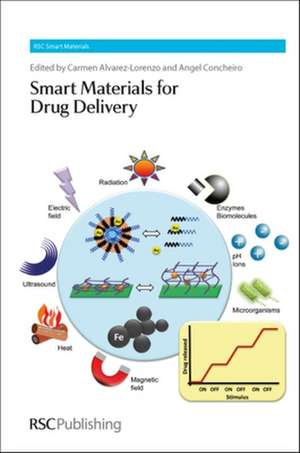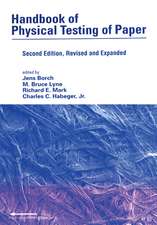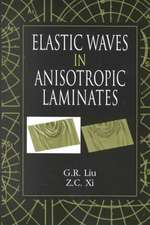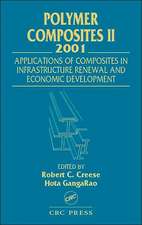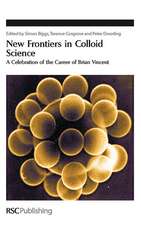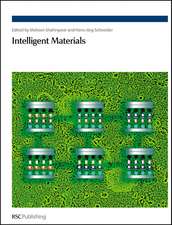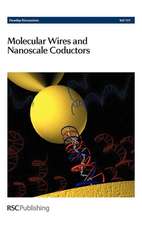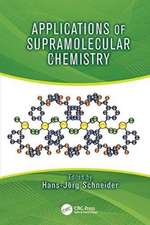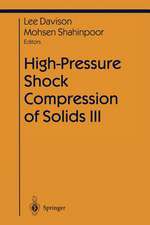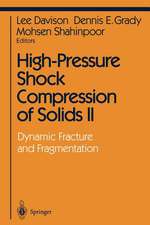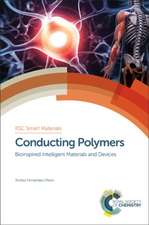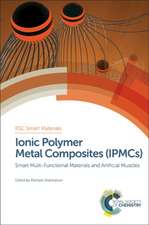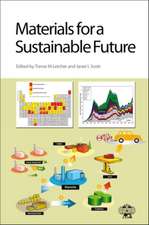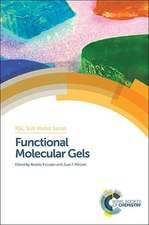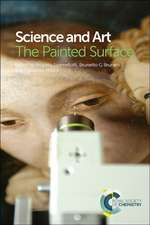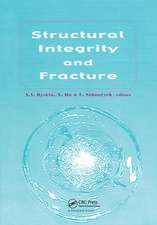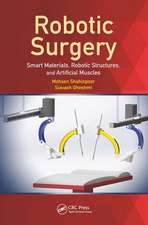Smart Materials for Drug Delivery 2 Volume Set: A Primer: RSC Smart Materials
Hans-Jorg Schneider, Mohsen Shahinpoor Editat de Carmen Alvarez-Lorenzo, Angel Concheiroen Limba Engleză Quantity pack – 16 apr 2013
Novel smart materials are needed for the design of intelligent drug delivery systems to enable the controlled release of active molecules. With so many papers available on smart and stimuli-responsive materials for drug delivery applications it's hard to know where to start reading about this exciting topic. Smart Materials for Drug Delivery will pull together the recent findings in the area and provide a critical analysis of the information available and how they can be applied to advanced drug delivery. Written by leading experts in the field, including a foreword from distinguished scientist Nicholas Peppas, The University of Texas at Austin, USA, the book will provide both an introduction to the key areas for graduate students and new researchers in the stimuli-responsive field as well as serving as a reference for those already working on fundamental materials research or their applications. This is the book to find out more about Smart Materials for Drug Delivery.
Preț: 1788.03 lei
Preț vechi: 2449.36 lei
-27% Nou
Puncte Express: 2682
Preț estimativ în valută:
342.13€ • 357.22$ • 283.16£
342.13€ • 357.22$ • 283.16£
Carte disponibilă
Livrare economică 15-29 martie
Preluare comenzi: 021 569.72.76
Specificații
ISBN-13: 9781849735520
ISBN-10: 1849735522
Pagini: 900
Ilustrații: Illustrations
Dimensiuni: 150 x 252 x 58 mm
Greutate: 1.61 kg
Editura: Royal Society Of Chemistry
Seria RSC Smart Materials
ISBN-10: 1849735522
Pagini: 900
Ilustrații: Illustrations
Dimensiuni: 150 x 252 x 58 mm
Greutate: 1.61 kg
Editura: Royal Society Of Chemistry
Seria RSC Smart Materials
Cuprins
Volume 1; From Drug Dosage Forms to Intelligent Drug-delivery Systems: a Change of Paradigm; Materials Science and Engineering of the Low Temperature Sensitive Liposome (LTSL): Composition-Structure-Property Relationships That Underlie its Design and Performance; pH-sensitive Liposomes in Drug Delivery; Smart Dendrimers; Temperature- and pH-sensitive Polymeric Micelles for Drug Encapsulation, Release and Targeting; Ultrasound-triggered Release from Micelles; Smart Polymersomes: Formation, Characterization and Applications; Reduction-sensitive Nanosystems for Active Intracellular Drug Delivery; Enzyme-responsive Drug-delivery Systems; Bioresponsive Polyplexes and Micelleplexes; Drug-delivery Systems Based on Intrinsically Conducting Polymers; UV and Near-IR Triggered Release from Polymeric Micelles and Nanoparticles; Volume 2; Remotely Triggered Drug Release from Gold Nanoparticle-based Systems; Magnetic-responsive Nanoparticles for Drug Delivery; Smart Drug Delivery from Silica Nanoparticles; Smart Carbon Nanotubes; Smart Layer-by-Layer Assemblies for Drug Delivery; pH- and Temperature-responsive Hydrogels in Drug Delivery; Elastin-like Hydrogels and Self-assembled Nanostructures for Drug Delivery; Multiple Stimuli-responsive Hydrogels Based on ?-Amino Acid Residues; Molecularly Imprinted Hydrogels for Affinity-controlled and Stimuli-responsive Drug Delivery; Biomolecule-sensitive Hydrogels; Intelligent Surfaces for Cell and Tissue Delivery; Drug/Medical Device Combination Products with Stimuli-responsive Eluting Surface;
Notă biografică
Carmen Alvarez-Lorenzo became Professor of Pharmacy and Pharmaceutical Technology at the University of Santiago de Compostela, Spain in 2007. Previously she was a postdoc and visiting scientist in the Department of Physics and Centre of Materials Science and Engineering at Massachusetts Institute of Technology, USA (1988 - 2001), working under the supervision of late Prof. Toyoichi Tanaka and then undertook a Ramon y Cajal posdoctoral researcher fellowship at the University of Santiago de Compostela, Spain. Her research interests include Intelligent hydrogels for selective and controlled drug delivery, stimuli-sensitive and imprinted polymeric systems for controlled drug release, nanoscopic micellar structures made of poloxamines for solubilizing and stabilizing drugs. She has published 114 papers in scientific journals, 10 book chapters and 7 patents.
Angel Concheiro is a Professor of Pharmacy and Pharmaceutical Technology at the University of Santiago de Compostela, Spain (since 1988). He has carried out an intense scientific activity in the area of drug delivery systems and the application of natural and synthetic polymers for the development of advanced drug carriers and drug-eluting medical devices. He has published nearly 200 research publications and contributions in relevant journals and books as well as four patents. He has recently been awarded with the Pharmaceutical Sciences World Congress Research Achievement Award 2010 from the International Pharmaceutical Federation and American Association of Pharmaceutical Scientists.
Angel Concheiro is a Professor of Pharmacy and Pharmaceutical Technology at the University of Santiago de Compostela, Spain (since 1988). He has carried out an intense scientific activity in the area of drug delivery systems and the application of natural and synthetic polymers for the development of advanced drug carriers and drug-eluting medical devices. He has published nearly 200 research publications and contributions in relevant journals and books as well as four patents. He has recently been awarded with the Pharmaceutical Sciences World Congress Research Achievement Award 2010 from the International Pharmaceutical Federation and American Association of Pharmaceutical Scientists.
Textul de pe ultima copertă
Smart materials, which can change properties when an external stimulus is applied, can be used for the targeted drug delivery of an active molecule to a specific site in the correct dosage. Different materials such as liposomes, dendrimers, polymeric micelles, polyplexes, nanoparticles, nanotubes, hydrogels and medical devices can respond to different stimuli such as pH, temperature and light and these are all attractive for controlled release applications.
With so many papers available on smart and stimuli-responsive materials for drug delivery applications it’s hard to know where to start reading about this exciting topic.
Smart Materials for Drug Delivery brings together the recent findings in the area and provides a critical analysis of the different materials available and how they can be applied to advanced delivery systems for drugs, genes, and even cells.
With contributions from leading experts in the field, including a foreword from distinguished scientist Nicholas Peppas, The University of Texas at Austin, USA, the book will provide both an introduction to the key areas for graduate students and new researchers in the stimuli-responsive field as well as serving as a reference for those already working on fundamental materials research or drug delivery applications.
With so many papers available on smart and stimuli-responsive materials for drug delivery applications it’s hard to know where to start reading about this exciting topic.
Smart Materials for Drug Delivery brings together the recent findings in the area and provides a critical analysis of the different materials available and how they can be applied to advanced delivery systems for drugs, genes, and even cells.
With contributions from leading experts in the field, including a foreword from distinguished scientist Nicholas Peppas, The University of Texas at Austin, USA, the book will provide both an introduction to the key areas for graduate students and new researchers in the stimuli-responsive field as well as serving as a reference for those already working on fundamental materials research or drug delivery applications.
